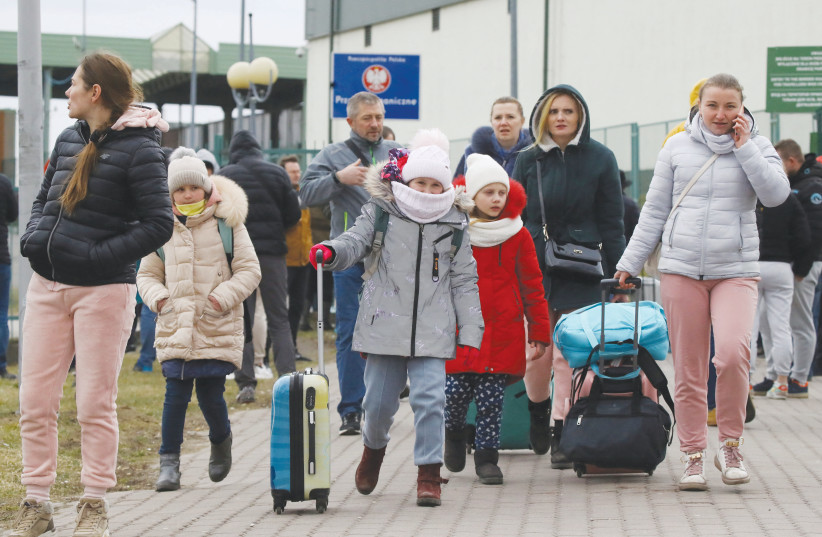As the war in Ukraine grinds on, so do the difficulties for the citizens of Ukraine, including the Jewish community. The exodus from the country has slowed down to a trickle. One American rabbi who was at the Polish border a week ago told me, “It’s hard to find a Jewish refugee. Those coming are driving beamers.” There are some Jews still leaving, primarily from cities under fire. Today, 80% of Ukrainian Jews are still in the country and it seems most are not leaving, for now. They are hunkering down, hoping the conflict will end soon. Some are staying because of fathers, husbands and sons of military age who can’t leave. Others are caring for elderly parents. Some fear the unknown, where they will end up, wary of wandering from one refugee center to another. Others are not willing to give up their lives, homes and communities.
The response from the global Jewish community has been magnificent. Major Jewish organizations have stepped in, providing vital help and evacuating thousands. The Jewish Agency has facilitated a major aliyah to Israel. Jewish groups around the world have raised significant funds to help their brethren and those beyond the Jewish community. It’s been an astonishing moment of Jewish concern and responsibility.
Now, what’s next? Two significant challenges lay ahead, one short term and the other long term. Today, the crisis for Jews in the Ukraine is over basic necessities like food and medicine. Jewish organizations such as the Jewish Federations of North America (JFNA), the American Jewish Joint Distribution Committee (JDC), the Agudath Israel of America (Agudah), the Orthodox Union (OU) and others have mobilized resources to provide much needed humanitarian aid. Some have made financial grants, others are supporting the effort from just outside the border. Through the communist years, Chabad operated an underground.
With the fall of the Soviet Union, Chabad has become the primary force of Jewish life in Ukraine. Billions have been invested into communal infrastructure – synagogues, schools and social services. Now, Chabad has pivoted to providing for their communities’ most basic needs. One rabbi told me of the truckloads of medicine and food he has shipping from the border to his city, at the edge of the battle zone. “Along the way, some people take a bit of tax, but we are getting the shipments in.” Another rabbi, who has remained in place in a town along a border said, “Every day, I send people to across the border to get medicine that we are then distributing to those who need it.”
Sending in these provisions needs to be top priority at this point. Then, as the war hopefully draws to some kind of conclusion, we need to focus on the future of Jewish life for the hundreds of thousands of Ukrainian Jews, most of whom remain there now.

The Jews of Ukraine were forced into a spiritual hibernation for seven decades. Pockets of resistance kept the flame of Judaism alive until the fall of communism. But, the vast majority of Jews in Ukraine have little Jewish knowledge, though warm Jewish hearts. An astonishing Jewish renaissance has taken place. Ukrainian Jewish communities have blossomed into self-sufficient dynamic centers of Jewish life. After being the recipient of the kind efforts of activists to send them matzah during the Soviet days, today, Ukraine is a major international exporter of matzah. World Jewry cannot let this vibrant Jewish community wither away. Investments will have to be made to rebuild the communal infrastructure and get it back on its feet.
The strategy forward has two stages. In the short term, increase our efforts in humanitarian aid to the 80% of Ukrainian Jews who are still in the country, and assist those evacuating and choosing to make Aliyah. In the long term, we will have to focus on rebuilding and sustaining Jewish life that will ensure that the Jews of the Ukraine will remain connected to Judaism, the Jewish people and Israel.
The writer is president of the Rabbinical Council of Orange County, California. His email is rabbi@ocjewish.com
